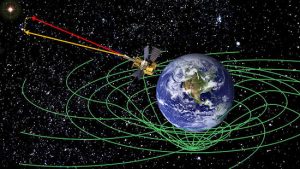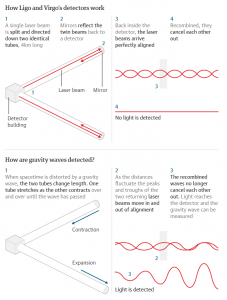In the recent past, a groundbreaking discovery was made in physics, making headlines around the world. Regardless of whether you are a scientist or not, it is likely that you have heard about it: the discovery of evidence for gravitational waves. But what are gravitational waves, and why are they a big deal?
If I were to ask you to name some forces, you might think of, for example, gravity, friction, or magnetism, which come from us observing everyday interactions, like apples falling, rubbing an eraser, or paperclips sticking to magnets. In actuality, there are fundamentally only four types of forces in the universe (although scientists are now potentially suspecting a fifth one), with gravity being one of them.
To better understand gravity, we first need to look at one idea that Einstein is famous for: his idea of a space time continuum—that our universe is a 4-dimensional object formed by the 3 dimensions of space and 1 dimension of time (Figure 1). Gravitational waves are disturbances in this continuum resulting from the gravity between objects. Their existence was predicted by Einstein under his theory of relativity a century before their discovery.

Figure 1:An artist’s depiction of a probe measuring the curvature of spacetime around Earth. Source: NASA.
But despite us being held down by it, gravity is actually a very weak force (compared to the other forces), and this is what has made detecting gravitational waves so challenging. The strongest gravitational waves, for example, would result from something like the colliding of two massive black holes in the video below.
The discovery of gravitational waves was finally made by renowned physicists Rainer Weiss, Barry Barish, and Kip Thorne (for which they won the 2017 Nobel Prize in Physics) at LIGO: the Laser Interferometer Gravitational-Wave Observatory. Figure 2 illustrates how they made the discovery.

Figure 2: How LIGO and Virgo’s Detectors Work. Source: The Guardian (originally sourced from Scientific American).
For a more detailed explanation, along with challenges encountered, Derek Muller of Veritasium explains nicely in this video:
A year later, gravitational waves were detected for the fourth time. This time, it was done with three detectors: LIGO’s two detectors and the Advanced Virgo detector in Italy. This increased the accuracy of the location which astronomers can calculate the source of the waves roughly tenfold.
So why does any of this matter?
In the universe, there are phenomena which emit little to no light, such as black holes and neutron stars—the results of the core of a large star collapsing into itself after it explodes at the end of its life, i.e. a dead star. Because of this lack of light, they are very difficult to study, and we know little about them. But even though neutron stars are “dead”, they have fascinating properties, like magnetic fields a quadrillion times stronger than Earth’s. Scientists are hoping that we can use gravitational waves to study phenomena like them, and perhaps other similar objects we do not even know about. The universe is a vast place, with much to explore, and the discovery of gravitational waves has given us a powerful new tool to study this beautiful world.
-Cliff Ng
References
Drake, N.; Greshko, M. What Are Gravitational Waves, and Why Do They Matter? https://news.nationalgeographic.com/2017/10/what-are-gravitational-waves-ligo-astronomy-science/ (accessed Jan 13, 2018).
Macdonald, F. IT’S OFFICIAL: Gravitational Waves Were Just Detected With The Greatest Precision Ever https://www.sciencealert.com/new-ligo-virgo-gravitational-waves-neutron-stars-space-news-sept-2017 (accessed Jan 13, 2018).
Odenwald, S. What is a space time continuum? https://einstein.stanford.edu/content/relativity/q411.html (accessed Jan 13, 2018).
UCI physicists confirm possible discovery of fifth force of nature https://news.uci.edu/2016/08/15/uci-physicists-confirm-possible-discovery-of-fifth-force-of-nature/ (accessed Jan 13, 2018).
What are Gravitational Waves? https://www.ligo.caltech.edu/page/what-are-gw (accessed Jan 13, 2018).
